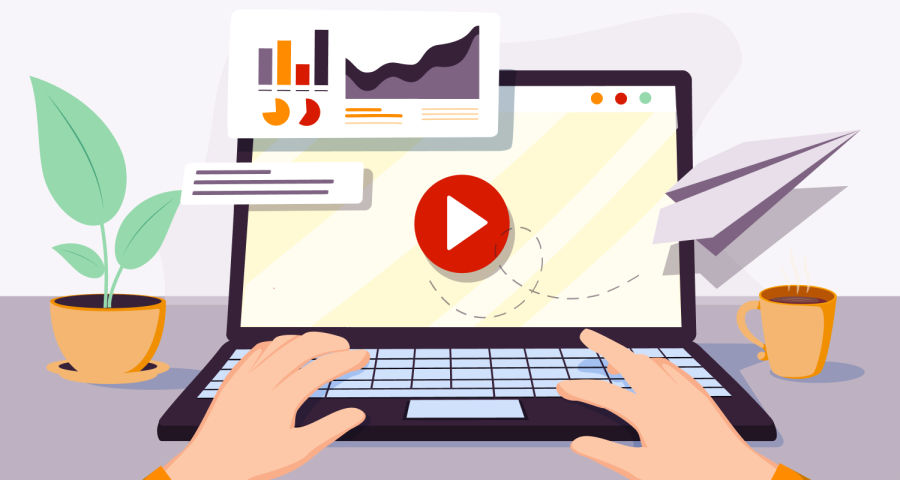//
Aug 10, 2023
Manufacturing and Marketing | Watermark Water Cooler
Manufacturing and Marketing | Watermark Water Cooler
Cameron Burns: Hello Trevor. Welcome to the Watermark Water Cooler. How are you doing today?
Trevor Baillie: Doing great, thanks for having me here.
Cameron Burns: So, Trevor has done a lot in sales and marketing. Trevor, tell us a little bit about yourself and what you're up to.
Trevor Baillie: So I have over 30 years of sales, marketing, operations, and business experience working for small, medium, and three multi-billion dollar corporations. In that time as well. I've owned three of my own companies and I've done a lot of small business consulting. Currently, what I'm doing is starting up a new company that is going to specialize in the automation industry, and that's what I plan to do for the next ten years. And then after that, I hope to retire on some sunny beach.
Cameron Burns: I like it. I like it. So, as you can tell, you know, Trevor's been doing this for a really long time. He has a lot of experience from small to large companies. And what we want to talk to you about today, Trevor, is, you know, manufacturing companies and marketing and how these things work and what are the pitfalls and what are the things that work really well.
Cameron Burns: So can you briefly tell me about your experience in manufacturing and sales? What does that look like? How does that look for you?
Trevor Baillie: Yeah, so that's a good question. So, a lot of pitfalls when it comes to B2B marketing for small business organizations are: A) they don't separate sales and marketing. They primarily do sales and they do very little marketing. They might have a website, however, they're not optimizing that website, utilizing a company that provides SEO and a number of other ways to help customers.
The other thing is they generally don't have a strategy plan when it comes to marketing. They don't plan marketing campaigns. They're not sending out regular notices to their customers. They're not, on a regular basis, attracting new customers through marketing techniques or methods. Their primary way of attracting new customers is building relationships one-on-one from a personal standpoint because that's what they know. They are not up to speed with the latest and greatest when it comes to marketing methods or techniques.
Typically they don't have anyone who specializes in marketing on the team. And typically in small businesses, the owner is a jack of all trades. And so, because things are built on relationships and they understand sales by virtue of one on one, they stay in their own lane or in their own little world and they don't go outside of that. And so what happens is, over time, they just continue to go down the same path and do the same thing over and over and over.
Cameron Burns: Well, you just laid out a bunch of things. Let's unload some of that because I think you answered some of it. Why do you think, you know, budget is one part of that, right? Like, I’m going to kind of break down some of the things you said. So one thing I heard you kind of say is they don't have a budget set aside for marketing.
I know that you've been on the side of like trying to convince, you know, hey, we need a budget for this to make this work. What do you think is holding somebody back from going, oh, I’ve got to put some budget into marketing?
Trevor Baillie: Well, a lot of the drawback is they don't know what they don't know. So, typically they don't have strategy planning. They don't do strategy documents because they never have and they don't know how to do that. And what they don't understand is that they need to have these plans in place for marketing or for an increase in their customers.
But in order to do that, you may be a small business, but you need to think like you're a larger organization and you need to start using tools and techniques like a larger organization does in order to build your small business. The other thing too, is they need to have a growth mindset. Typically, many small business owners, as long as they're turning a profit and they're making money for themselves continuously doing the same thing over and over, they're very content with what's going on.
So honestly, they just don't plan. They don't realize, hey, I need a budget for this and that, or why is that important? I'm making money, I'm doing well, and everything's all good today.
Cameron Burns: Yeah, so they don't realize, hey, this budget is going to help. You know, maybe the mindset has shifted for the decision makers to, hey, I got to do some research on this company before I make that purchase.
And where are they going to go to do that research? Online, right? They're going to go do a search. Typically that’s how most people do their initial glance at, hey, I'm looking for X, Y, Z products, I'm going to do a quick “what’s out there?” you know. And so if you're not findable then that's part of the problem.
But, with that relationship-based model, what do you see as the problem with just going off a relationship? Like you said, hey, they're doing fine with just this plain same old relationship. I have these relationships that I've had. I'm going to keep using them. Well, you know, what's wrong with that?
Trevor Baillie: Well, the problem I see is it's narrowly focused. When you’re doing relationship building, first of all, it can take a long time for those relationships to take hold and build. Second of all, the one cost is we all have the same amount of time. And if we're spending all our time building relationships and we're not using tools and techniques where there are other methods to bring in new customers or new prospects, then what happens is, as that time goes on, you're losing out on what you could have and those other prospects out there that you're unaware will then move to your competition because your competition is using those new tools, techniques, and technology to acquire those customers.
Cameron Burns: Did you experience that where you came across somebody who said, Yeah, man if I could have found you earlier... or I was in that buying mindset three months ago, you're too late, you know, like I would have bought from you if I would've known you existed three months ago because I had needed it three months ago and now I don’t.
Trevor Baillie: Yeah, I've experienced that multiple times while consulting with a handful of companies. They want you to prospect by going out and seeing people because that's the only avenue they have. And that's the only method they think that works. And you're absolutely right because you're going out and you're seeing these customers one-on-one numerous times, it has happened to me where the customer said, Man, if I would have met you only three months ago or four months ago, or hey, we've already spent our money or hey, come back in a year because we'll start a new budget cycle.
Trevor Baillie: And if you're out there seeing everybody one at a time, you just can't get to all of them in the time that you need to really make those sales. And I would bet that anybody that does a role where they're meeting people and building relationships one at a time, will come back to you and say they've experienced that over and over and over where the timing just didn't happen when they needed it to.
Cameron Burns: Such a big key of, you know, doing a good job of this stuff is meeting that person in their buying journey where they're at and who what salesperson doesn't like a sales qualified lead getting dropped to them who's already done the research. And at that point, you're really just a consultant to them and trying to hear what their problems are that maybe your solution can solve for them.
Trevor Baillie: Yeah. The other thing that can happen when you're building relationships one-on-one and going down that sales path is you'll meet somebody who's interested but if the sales cycle is somewhat long, while you're continuing to nurture that client and work with them to build to a sale, you're missing out on other prospects.
And what happens now and then for some unforeseen reason, you work on that customer where you know the potential customer for two or three months, the sale falls through, and not only did you lose out on those initial prospects, but you obviously lost out on the sale you were working for that three months as well. And that can start setting businesses behind too.
Yeah, that’s really tough. So, in your kind of time when you're consulting with an owner and they were kind of saying like the push back of you know no I don't need this... What was their kind of biggest reason why? Was it always budget or were there other reasons?
I would say it's a lack of understanding of why we need these tools, and how they work, I've always done the same thing that's worked for me for the past 15 to 20 years, why do I need to change? Because as we all know, change can be scary. I would think it's more than even the budget.
It's an educational process. And the fact that it takes time. I believe some folks think that when you're going to start utilizing a new tool or technique, hey things should happen overnight. And it just doesn't work that way. It's going to take a little time to implement, a little time to get it moving, and a little time to reach out to the prospects again.
But if you go down that path, you know, one, two, three years down the road, you're going to get so many more prospects coming in on a regular basis versus doing the same old thing and going, you know, to a prospect one at a time.
Cameron Burns: Yeah, that’s kind of interesting that you say that it's more of a fear thing or an educational thing than it is a budget thing. But I mean, also the interesting thing about that is you would think that the, maybe the opportunities that got missed would kind of open eyes to people to say like, hey, I could have had this opportunity, or are they just not aware those opportunities are missing?
Trevor Baillie: I think it's a little bit of both. But yeah, at the same time, if you think about a small business, if they get a good sale, they don't think of all the things they're missing out on... they're excited about the one sale, and then that sale can carry them for another month or two or three, and then they're on to the next and they don't realize how they're missing out or don't realize what their competitors are doing, which is they're gobbling up, you know, their potential customers or prospects little by little as time goes on.
Cameron Burns: As you are kind of going into these new places, you know, you're probably a lot of times the first time they'd ever heard of the company that you were working with. I'm assuming that was a solid barrier to entry like, Hey, Trevor, I've never heard of you before.
I've never heard of the company you're working for. Now you're kind of at their mercy.
Trevor Baillie: Yeah, that's true. You'd be the first one walking in, the first one meeting with them, they hadn't heard you before, they want to check you out, they want to see a website, they want references, and then even if everything pans out and the product is something that they're interested in, we all know that it's all about the connection between the person coming in and the product.
That's just how good the product is. And if some of these prospects are long-distance and they want you back another week or another month, it can be time-consuming to go back, especially if it includes flying. It can be expensive. Things come up and you might not be able to make the timeframe you need to or you go back and something comes up on their end and then they're not there.
Or they say, Yeah, I'm ready to buy. And then you go back and you see them a month later or whatever it may be, and for whatever reason they're not ready to buy. The harder thing is, you see these customers and it'll generally take several visits before you have a strong relationship before they're going to buy something because they want to ensure that you're going to be there for them.
Cameron Burns: Do you think that would change if they had made that first touch digitally and there were some nurture along the way that could have shortened that cycle?
Trevor Baillie: Yeah, I definitely believe that it would help out if there was a digital touch in the beginning, because what that does is it kind of takes care of a lot of the introductory parts and gives them information. They can start digesting, start thinking through, start working through, and then by the time you show up, it's not like you're starting from scratch.
They have some information. They thought it through. They've kind of decided if they want it. Those types of things. And then when they talk with you, you're just reinforcing what they've already learned or what they already know.
Cameron Burns: Yeah. And I think something you said also about this is like, so if their first touch is the travel piece, the costs associated with the travel piece, just to get you to that touch. That maybe could have been covered if the budget was ever a conversation. That could have been covered in the marketing budget and then that first touch would have saved a bunch of money and then yeah, maybe you needed to have those two extra touches after that where you were in person.
But it saved you, you know, all that travel up front and all that like first introduction stuff. So maybe that’s still some conversation point with some people as they're thinking about their business, like, hey I could actually save myself some money by reducing the amount of time that people are actually out trying to make that first touch if they made the first touch with the digital approach.
I think we both agree on this—You have to have outbound. Like, there still has to be a relationship built. I would never tell anybody that the outbound piece is gone. You have to have those relationships built where you meet people and have conversations and realize that there's something to the trust factor, especially in manufacturing. Like, this person is going to be reliable, they're going to get it done.
I met Trevor or I met that salesperson and had a really good feeling about that connection, and they're going to do what they're going to do. So I don't think you would agree that you should ever take that part out?
Trevor Baillie: No, you're not going to completely take that part out. But if upfront, you can reach out to them digitally, you can start building a good relationship, you know, utilizing the phone or email. You can do a lot of touches before you actually go visit the person.
The other thing too, is you got to look at the generational aspect of it. A lot of small business owners today, if they're at a certain age, uh, they don't understand the transition that's going on with technology and digitization. And what you'll find with a lot of small business owners, especially if they have a son or daughter involved with the business, is you're kind of having a conflict there where the older generation is the primary owner of the business and they’re hanging on and wanting to continue to do the same things and doesn't understand what the younger generation wants to do.
And the younger generation is trying to get the older generation to move more to a technological path. And so you kind of have a little bit of head butting going on at this point in time depending on product or service.
Cameron Burns: Yeah. Actually, I think that brings us to a really good point—the utilization of a CRM and how are you using that the right way. From my experience, a lot of times I run into, you know, small business owners that are, again, we're talking small business, but that can be a ten million dollar company.
Trevor Baillie: Yeah.
Cameron Burns: That's still considered SMB—small to medium-sized business—so we're still talking about a sizable company that has never used a CRM before and they're still operating off of either like an Excel sheet that's basically a glorified Rolodex. No, there is no documentation of what sales is doing. So it's kind of like a free-for-all all.
And so that's another, I think, a piece of understanding sales and marketing and what's going on, because the marketing side can now start using the CRM to understand how to do better touch points. And there are automation options and all kinds of things that you can do now to help sales out in the market side with a CRM.
Trevor Baillie: Yeah, I also found that's a problem as well and that's been going on for quite some time. And I know numerous small businesses that do not utilize a CRM. They either utilize, say, Excel spreadsheets, or the individual people who are responsible for sales have their own method. They may just keep their contacts within their email system or phone system or the company as a whole will just, you know, they only look at the actual customers they have and they're in, say, their QuickBooks system, but they don't keep track of all the potential prospects they've come across, which can also be used, you know, in an automation marketing campaign and whatnot.
So there's a whole host of gaps in that area as well. But again, if the business is making money, everything seems okay to many of these folks and it's just going to take time before everybody moves over to a CRM or whatnot. And still even today, surprisingly enough, many small business owners have never even heard of CRM.
They ask, “”
Cameron Burns: From my experience, it seems like the manufacturing industry is one of the slower ones to uptake this kind of new technology. Is it again, just because, hey, we're making money, so why change, or is there another reason why?
Trevor Baillie: That's a really good question. Typically manufacturing, especially in say, agricultural food and beverage manufacturing, those types of industries are several years behind other companies that do work with technology, I believe a lot of it is because in many manufacturing companies, especially small ones, the people have been there a long time and a lot of it is hands-on and it's manually done.
And again, it's just, you know, a lot of these folks have been in their own world for a very long time. And when you're working in your own world or you're the jack of all trades in your own world, it is hard to get outside of that, go visit other companies, get more experience from other folks who have done a number of other things to really grow and expand your business.
And then at the same time, again, manufacturing as a whole has just generally been behind.
Cameron Burns: Yeah, it's interesting because while manufacturing is always going to be something in demand—and that's what I kind of feel like part of it is like again, we could just keep doing the same thing because it's always going to be in demand and we don't have to change. I guess my kind of thought is that eventually that clock is going to run out in my opinion, and it's like we're either going to get left behind or your competitors are going to figure it out and start doing these things.
Well, Trevor, I think we've covered a bunch of things. I appreciate you coming on and giving your kind of perspective on things. If you had something to leave to a manufacturer owner who is on the fence about how these things work should I actually start committing to some marketing techniques or start getting into a CRM?
Is there anything you want to leave them with to say these are the reasons why we should make the change?
Trevor Baillie: I'd say right now, the reasons why manufacturing companies in general need to grasp the digitization and automation and technology and move to CRMs and things of that nature are costs are rising, labor is becoming difficult, and the world is moving much, much faster. And it's quite clear that those companies that do not take hold of all of these aspects, um, are going to fall by the wayside because they just are not going to be able to compete with the companies that are going down the technology and the automation route.
Cameron Burns: Again, thank you so much, Trevor, for taking the time to chat. We appreciate your time and we'll catch you next time.
Trevor Baillie: Thanks, Cameron. Take care.







